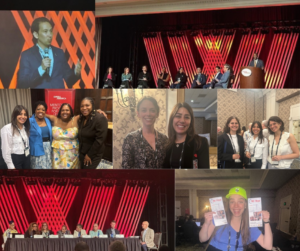 Last week, I had the privilege of representing the Association for Opera in Canada (AOC) at the Opera America conference in Memphis — and what an energizing and thought-provoking experience it was! From the vibrant musical pulse of the city itself to the powerful conversations unfolding in session rooms, this year’s gathering offered inspiration, urgency, and a collective call for transformation.
Last week, I had the privilege of representing the Association for Opera in Canada (AOC) at the Opera America conference in Memphis — and what an energizing and thought-provoking experience it was! From the vibrant musical pulse of the city itself to the powerful conversations unfolding in session rooms, this year’s gathering offered inspiration, urgency, and a collective call for transformation.
Opera’s Next Era: A Call for Bold Vision
One of the standout sessions, Opera’s Next Era, brought together industry leaders who dared to ask: What will opera look like in 2030, 2035, or even 2050? With the 21st century well underway, the session offered provocations, not prescriptions, and underscored a shared desire for change — in business models, creative processes, and community relevance.
Highlights included:
- Ekyndayo Bandele (Hattiloo Theatre, Memphis) urged the field to confront equity and inclusion head-on.
- Lidiya Yankovskaya (conductor, Chicago Opera Theatre) reminded us that empty seats are not excusable — audience engagement must be planned alongside revenue goals.
- Annie Burridge (general director & CEO, Austin Opera) emphasized unity, recounting how opera has the power to bring together even politically opposed individuals.
- David T. Little (composer) suggested hybrid models of nonprofit/for-profit operations may offer financial resilience, drawing parallels to artists who balance commercial and creative work.
- Davóne Tines (singer and creator) invited participants to align civic practice with personal values
- Rhiana Yazzie (librettist, New Native Theatre) asked a powerful question missing from many institutional spaces: Do I feel wanted, loved, and cared for here?
- Jeffery Boid (National Executive Director, American Guild of Musical Artists) called for real solutions to address falling wages and financial precarity among artists.
- Danielle Birrittella (performer) reminded us: “Opera is ritual” — a deeply needed cultural practice in a time of disconnection.
And Michael Mori (general director, Tapestry Opera) asked: Are we defenders of the institution, or shapers of the art form? A question that is still lingering in my mind.
Several sessions explored how opera can strengthen its role in society — from becoming an irreplaceable cultural asset through greater social and civic relevance, to activating donors as advocates through peer-to-peer fundraising strategies inspired by the American Lebanese Syrian Associated Charities (ALSAC) (St. Jude Children’s Research Hospital). In Tell Your Story, Be Your Story, participants reflected on how personal narratives can disrupt isolation and foster belonging in a historically exclusive art form. A practical session on communication challenges also offered tools to improve dialogue across departments, artists, administrators, and boards — reinforcing the need for equity and connection at every level of the industry.
From questions of equity and sustainability to radical storytelling and community building, Opera America 2025 sparked urgent conversations about who we are — and who we want to become — as a field. I return to Canada with fresh ideas, new connections, and a renewed sense of possibility for the future of opera — one that is inclusive, innovative, and boldly reimagined.
— Rasha Masalkhi

